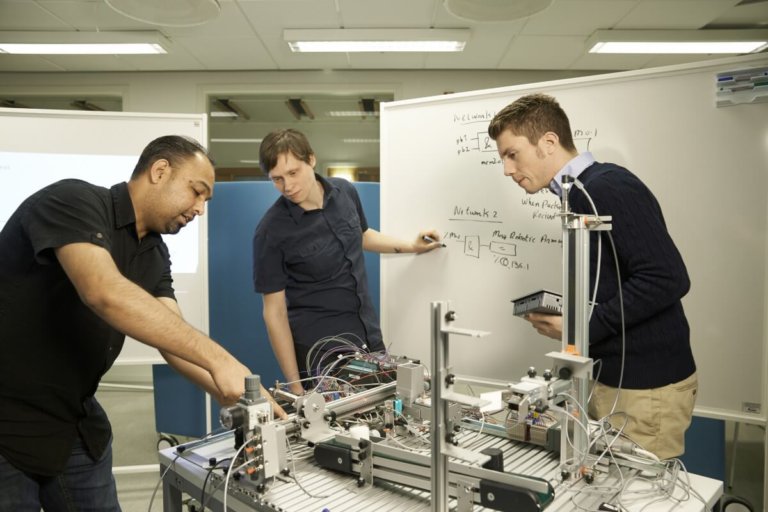
Technological advancements are showing no signs of slowing down. Various industries are under increasing pressure to adopt and invest in computer hardware and software to save costs and add value. Newer waves of technology, including the Internet of Things (IoT), are already being used on a granular level, such as in the development of smart homes.
Technology is unstoppable, which is why skilled professionals will need to step up to capitalise on the exciting opportunities this field has in store. The US Bureau of Labor Statistics projects the employment of computer and information technology occupations to grow 12 percent from 2018 to 2028, much faster than the average for all occupations.
Buoyed by advancing technology, a postgraduate degree in computer engineering can open the door to lucrative opportunities, be it careers in academia, private companies, and more.
To stay relevant or take their careers to the next level, graduates with a Bachelor’s in computer science, engineering or a related field would need to enhance their skill set and knowledge in the field.
If you’re keen on carving yourself a career in the field, here are five global universities that offer postgraduate degrees in computer engineering:
MID SWEDEN UNIVERSITY
At Mid Sweden University, education in electronics and computer engineering is conducted in close collaboration with research and industry. These subjects cover a broad range of areas – from design and processing of electronic devices to computer systems for measurements and communications.
The university offers two high-quality, international Master programmes fully taught in English: MSc in Computer Engineering and MSc in Embedded Sensor Systems (ESS). Students in these programmes study in a campus located close to the city centre and breathtaking nature, with small class sizes and highly accessible staff present to support them at every step of the way.

Mid Sweden University
The MSc in Computer Engineering programme is a multidisciplinary degree. Students gain advanced knowledge and skills in three essential areas: communication networks, data analytics, and security and privacy. This is in addition to developing a thorough understanding of computer systems and networks by training in computer science and engineering.
For the MSc in Embedded Sensor Systems, students will learn how to design ESS and how to connect them to different products, programmes and applications. With the drastic growth of the market for smart systems and products incorporating embedded systems, this programme – which puts theoretical knowledge to practical applications – will further enhance your employability.
Graduates from both programmes have found employment at renowned international companies such as Volvo Cars, Ericsson and Intel.
JOHNS HOPKINS UNIVERSITY
Study Electrical and Computer Engineering through Johns Hopkins University’s online graduate engineering program—No. 3 in the country, according to a new U.S. News & World Report ranking that asked peers to evaluate online graduate engineering programs at about a dozen top universities. ECE is one of 22 master’s and certificate options offered through Hopkins Engineering’s online graduate programs, ranked No. 13 overall by U.S. News.
At Hopkins, Electrical and Computer Engineering courses are taught by world-renowned professors who perform groundbreaking research in areas including medical imaging, speech and language processing and understanding, control theory, intelligent sensors, brain-like computer design, bio-inspired robotics and neuroprosthetics, renewable energy devices, and more.

Johns Hopkins University
Though rooted in cutting-edge research, the online ECE graduate program is designed to provide the broad skill set, experience, and knowledge that today’s industry jobs demand. Armed with the latest available knowledge and techniques, students emerge ready not only to thrive, but also to lead in an ever-changing and demanding field.
The Electrical and Computer Engineering program includes courses in several areas of the discipline, and offers specialized focus areas, including: Communications, Control Systems, Language and Speech Processing, Image Processing, Microsystems and Computer Engineering, Photonics and Optoelectronics and Robotics
UNIVERSITY OF TENNESSEE KNOXVILLE
The University of Tennessee at Knoxville (UT Knoxville) is home to the Min H Kao Department of Electrical Engineering and Computer Science (EECS), one of the top 25 public EECS departments and the premiere EECS department in Tennessee.
Studying at this university is affordable; the cost of living in Knoxville is 18 percent lower than the national average, according to PayScale. Meanwhile, the university is flanked by a strong faculty who are among the leading minds in engineering.

Shutterstock
For instance, students at the UT at Knoxville will learn from a strong faculty who are actively participating in their respective professions, enabling students to gain industry insights that can help enhance their career-readiness. Some of their research strengths include data analytics, intelligent systems, and machine learning; microelectronics and microwaves; power systems and power electronics; and sensors, networked and embedded systems, and cybersecurity, among others.
Qualified applicants can apply to the university’s MSc in Computer Engineering programme, which offers concentrations in Computer Architecture, Computer Networks, Computer Vision, Cybersecurity, Data Analytics, Embedded Systems, Energy Science and Engineering (PhD only), Image Processing, Information Systems and VLSI System Design.
POZNAN UNIVERSITY OF TECHNOLOGY
PUT is one of Poland’s most popular universities, with 100 years of experience of engineering education under its belt. It is located in Poland – among the safest countries in Central Europe – while the city of Poznan is known for its universities and for attracting students from diverse backgrounds. To boot, about one-fifth of the city is covered in greenery, ensuring students get to enjoy urban green spaces.

Poznan University
PUT offers an MSc in Electronics and Telecommunications programme, where students will learn how to programme in C, C++, C# and Matlab, create mobile applications for Android and IoS smartphones, solve several communication and electronic tasks, become familiar with optoelectronic circuits and systems, TV, antennas and microwaves, as well as effectively configure computer and wireless networks.
The course prepares graduates to perform research and development, equipping them for work in R&D centres as well as telecommunications and electronics companies. They will also be ready to manage engineering teams involved in designing new equipments, networks and services, in addition to undertaking doctoral studies, if they desire.
NATIONAL UNIVERSITY OF SINGAPORE
NUS has cemented its status as a bastion for education and research excellence in Asia, as attested by global rankings. They’re ranked first in the QS Asia University Rankings 2020 and 25th in the Times Higher Education World University Rankings 2020.
The university offers several engineering programmes under their Department of Electrical and Computer Engineering. At the undergraduate level, there is the Bachelor of Technology (Electronics Engineering) course, which aims to produce professional electronic engineers who not only have a strong foundation in the relevant sciences and technology, but also able to contribute to society through innovation, enterprise and leadership.

Shutterstock
Postgraduate students can choose from research or coursework-based programmes under the Department. For the latter, this includes the MSc in Electrical Engineering programme, which provides opportunities for practising engineers to upgrade their knowledge and core capabilities in various exciting areas of engineering involving nano-science, nano-technology, biomedical systems and digital and wireless communications, to name a few.
*Some of the institutions featured in this article are commercial partners of Study International
Liked this? Then you’ll love…
Launch your career in the innovative world of automotive engineering
Combining engineering and medical science for the betterment of society







